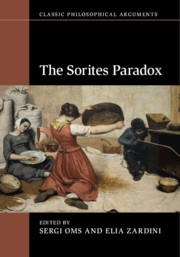15 - The Pre-Analytic History of the Sorites Paradox
from Coda
Published online by Cambridge University Press: 20 September 2019
Summary
The Sorites Paradox has a very long history, though one less rich than that of its close relative, the Liar. This chapter is divided into three sections. Section 1 presents a very brief and schematic overview of the pre-analytic history of the Sorites Paradox, from the Ancient Greeks to Kant and Hegel. Section 2 focuses on Chrysippus (Stoic from the third century BC), the ancient philosopher who worked most on the Sorites. Chrysippus held an epistemic view of vagueness and proposed a strategy to respond to the paradox in the context of a dialectical questioning (similar to what is now commonly called the Forced March) that deserves to be thoroughly examined. Section 3 focuses on Leibniz, who produced, in the author's view, the most interesting contribution in modern pre-analytic times on the paradox. Leibniz started by accepting that vague notions have sharp boundaries, but then changed his mind and moved to something like a semantic view of vagueness.
Keywords
- Type
- Chapter
- Information
- The Sorites Paradox , pp. 289 - 306Publisher: Cambridge University PressPrint publication year: 2019

